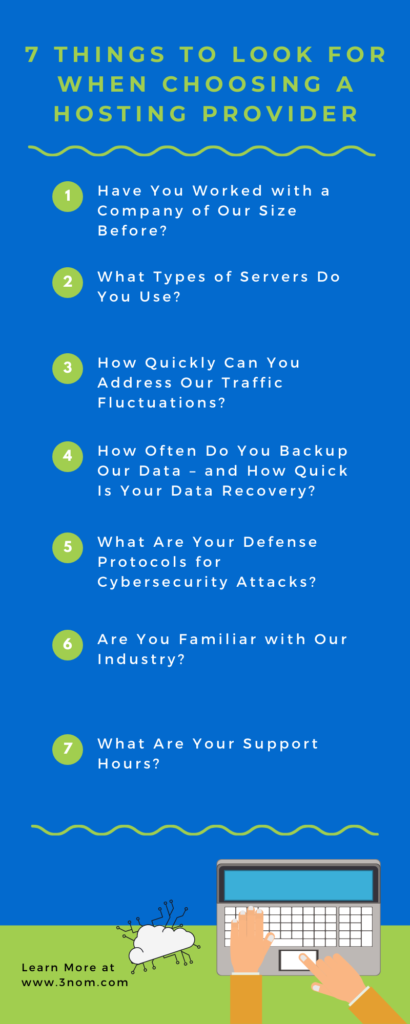WE HAVE A LOT TO SAY
IT SOFTWARE APPS CLOUD NEWS EVENTS
7 Things to Look for When Choosing a Hosting Provider
Choosing the right hosting provider for your business can make or break the efforts that you put into your online presence. This choice should receive serious consideration, and you should treat the process much like a job interview. Only this time, you will be doing the interviewing! A hosting provider who is worth their keep should have no problem spending some time with you and answering your questions. If they refuse to have these initial conversations, then you should run away faster than light traveling down a fiber optic cable! Here are seven things you should be asking during that initial conversation and what you should expect to hear back from a hosting provider you can trust.
Have You Worked with a Company of Our Size Before?
This question allows you to make sure the provider will be a good fit for your company and culture. It does not matter if you have 5 employees or 500, make sure the provider you are considering has done work with a company of your size before. You should listen for specifics in their responses. They should mention things like the specific size of other companies they have worked with. If you hear things that sound canned or like the company rep is just telling you what you want to hear, then that should be an immediate red flag. Try pressing for more details, and if you cannot get them, move on to the next choice.
What Types of Servers Do You Use?
There are four main types of servers ranging from the cheapest and the least reliable to the more advanced and still affordable. The most affordable option is a shared server you will be sharing with several other clients. In this case, the speed and responsiveness of your website depend on the shared load. The next step up is a VPS (virtual private server) where a virtual server fully dedicated to your business runs on a shared physical box. VPS shows a slightly better performance but ultimately carries over many of the issues of a shared server. The most expensive option ideal for high traffic volumes and loads is a private server. Coincidentally, it is also the most expensive, which often makes it prohibitive for budget-conscious businesses. The ideal alternative for most small and medium-sized businesses is a cloud server. These usually run on major public clouds like Microsoft Azure or Amazon Web Services. This allows for seamless scaling and customization at an affordable and predictable cost.
How Quickly Can You Address Our Traffic Fluctuations?
You may only be getting a few dozen visitors a day regularly, but if you are planning to run any time of promotions and drive traffic to your site, the answer to this question becomes important. It works both ways: you will get a sense of your potential hosting provider’s agility and readiness to respond to change, and also find out how much of a heads up about your upcoming promotional plans you will need to give should you be working together. A good additional question to ask is how much would a traffic spike cost you: are you looking at a sticker shock or can you expect predictable pricing month over month despite the traffic fluctuations? (Hint: you want the latter.)
How Often Do You Backup Our Data – and How Quick Is Your Data Recovery?
Frequent data backups are imperative, but how often these backups occur depends on several factors. A potential hosting provider should be able to offer advice and guidance on how frequently to back up as well as give you information on their backup procedures. Your business might be fine with daily backups, whereas another business may require hourly backups. A good hosting provider can listen to your situation and the types of data that you store and advice on best practices for backups. In addition, it is extremely important to understand how long it will take to get your data back should the need arise. Be wary of answers that do not provide specifics around their process and how they handle data recovery.
What Are Your Defense Protocols for Cybersecurity Attacks?
If you have an online presence at all, chances are high that you will be the target of a cyberattack at one point or another. Any potential hosting provider should be able to tell you exactly what threats you should be most worried about and how they can help prevent them. Be extremely leery of any hosting provider who guarantees complete breach protection. An experienced hosting provider will typically offer an “assume breach” policy and outline what will happen when you are breached. Your hosting provider should proactively monitor for breaches and mitigate their effects as fast and efficiently as possible.
Are You Familiar with Our Industry?
The ideal hosting provider has experience in your specific industry. Be direct – ask them about their experience and how it relates to your business and industry. The hosting needs of a bank are far different from the needs of a plumbing company. Likewise, the needs of an auto repair shop are totally different from the needs of an e-commerce store. Watch out if your potential provider just talks about the basics and generics of hosting. Listen for potential solutions that they can offer based on their experience to specifically help your business.
What Are Your Support Hours?
You need someone who can offer 24/7 support because issues and cyberattacks never sleep. If you need help outside of business hours, it does you no good if your provider only offers support from 8:00 to 5:00. You cannot risk an issue or breach going that long without a response. If the provider you are talking to says that nothing bad ever happens overnight, then run away! Find one who realizes how important around the clock support is and is also willing to stick to it.
3nom has been providing reliable hosting to dozens of clients for over 15 years. Contact us today to find out what the “everything you need, nothing you don’t” custom web hosting is all about.





